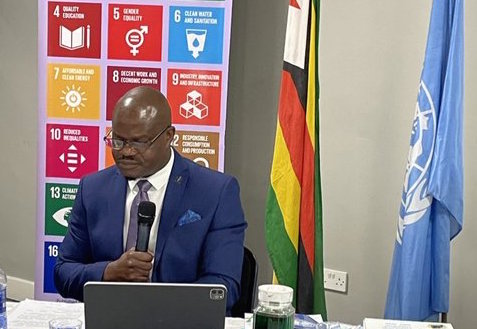|
Getting your Trinity Audio player ready...
|
Mr. Nick Mangwana, the Permanent Secretary for the Ministry of Information, Publicity and Broadcasting Services has underscored the important role that development reporting plays towards the attainment of sustainable development goals (SDGs).
He made the remarks at a workshop on development reporting organised by the United Nations in Zimbabwe that kicked off in Mutare today.
“Development reporting in the media industry is appreciated as it is rich in content depth, in an endeavour to create awareness and mobilize the masses to take an interest in various developmental projects working together with the Government and its stakeholders.
“Development reporting is guided by the UN’s sustainable development goals (SDGs) which seek not to leave anyone behind by the year 2030, in line with the country’s vision and aspiration of attaining an upper-middle-income economy by 2030,” Mr. Mangwana said.
He said development reporting requires a different skill set than other forms of reporting since it involves writing on programmes and policies that result in economic change.
Mr. Mangwana added that for development reporting to thrive, the media landscape must allow free flow of and access to information.
“This is made possible by the amendment of media law reforms in line with the Constitution. The Freedom of Information Act which was passed into law repealing the Access to Information and Privacy Act (AIPPA)is a major landmark that seeks to ensure public access to information, which the New Dispensation is more inclined towards as it seeks to attain an upper-middle-income economy by 2030,” Mr. Mangwana added.
Speaking at the same workshop, Mr. Muchineripi Nemhara from the Ministry of Public Service, Labour and Social Welfare said his ministry was assigned the mandate to coordinate the implementation of SDGs at a technical level in 2018.
“The Ministry is being supported by the Ministry of Lands, Agriculture, Water, Fisheries and Rural Development, and the Ministry of Health and Child Care.
“The Government is working together with the Development Partners, Private Sector, Local Authorities, Non-Governmental Organisations, Faith-Based Organisations, Civil Society and other stakeholders in implementing SDGs,” he said.
He revealed that progress has been made towards universal health coverage through sustained investment in public health infrastructure, medical equipment, and the capacitation of human resources.
“The proportion of births assisted by skilled health personnel increased from 80% in 2014 to 86% in 2019. This has resulted in a reduced maternal mortality ratio per 100 000 live births from 614 in 2014 to 462 in 2019, reduced under-five mortality, and a general decline in HIV prevalence by 56%.”
Mr. Nemhara revealed that the Government instituted an economic reforms agenda which prioritised fiscal consolidation, economic stabilization, stimulation of growth and creation of employment. This is evidenced by the establishment of Empowerbank for youths, Zimbabwe Women’s Microfinance Bank and other initiatives such as innovation hubs to promote SMEs development, the youth and women empowerment






